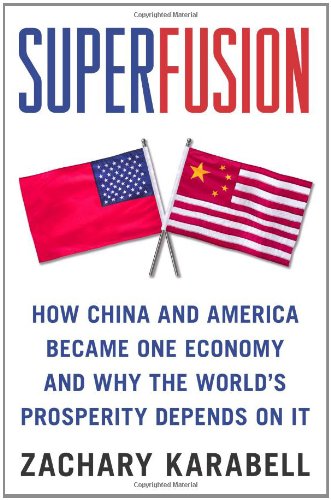A Book Review of "Superfusion: How China and America Became One Economy"

In this book, Karabell explores the interrelationship of China and United States Economy including its historical perspective. The author observes that the interrelation of Chinese and American economy has taken over two decades to evolve and that it shapes the future of the world economy. However, the current events and in specific the economic crisis brought about the 2008 recession, there have been questions on the viability of the continued upholding of this relationship by the two countries Though the tensions have been apparent or significant to America, Karabell perceives that this tension will only escalate if America does not find ways to strengthen this relationship more. The author’s opinion is that reinforcing the relationship between China and US will be for the good of the two countries and the world at large.
The author explains that U.S has come to rely on China as a key lender in order to run its economy effectively. This shows that China is gaining worldwide prominence in economic terms considering that U.S is a superpower. Indeed, Chinese economic policies have enabled the country move out of poverty and make a significant economic progress. This is also showcased by the rising number of middle and high income earners in a country that was depicted by high rate of poverty. It should also be considered that China is currently a key lender to many developing and developed nations. This showcases how sound effective economic policies can propel a country from one level of economic status to another. Further, the strong Chinese economies have led to U.S to warm up to China as her key partner in economy and development.
As revealed by Karabell, arguments against the dependence of U.S on China for its economy are misplaced. Among the reasons is that this symbiotic relationship has been going on for long without being noted. He explains, "nobody analyzes the global economy as a system and because nobody developed a theoretical framework to predict it"
There is a consideration that the two superpowers represent two different classes, the low and high and hence, there is always a need to balance these classes. American companies have been able to succeed in Chinese business environment due to low cost of operations as compared to U.S. The sound Chinese economic policies and low cost of its operations have propelled its expansion and growth. On the other hand, the poor economic policies and high cost of operation plus high spending have continued to dwarf American economy. This means that the country has to seek some aid to keep its economy running.
Karabell in this book provides rules on how companies can effectively adapt to international markets. He gives account on the strategies utilized by American companies to succeed in America. One of these is for companies to provide unique products that differentiate them from others so as to create an appeal. Another very important rule is for these companies to adapt to the local systems and culture. This is because many people would be worry about a foreign company with its own alien culture and systems. In other words, consumers prefer and trust what they are already familiar with. Further, companies must be ready for risk and uncertainties that are typical in foreign markets.
Karabell outlines that U.S directly relies on China for goods products since many of its products are produced in China due to low cost. In addition, China is also a rich market for U.S goods and services. On the other hand, China is a great investor on U.S specifically through treasury and debt bonds. Furthermore, China depends on U.S expertise in establishing business framework and systems. This means that the relationship will go as long as possible since the countries need one another. Karabell points out that,"the Chinese and U.S. economies have fused to become one integrated system "
The events taking place in Karabell’s book clearly shows the need to embrace a free global market. This idea is reinforced by the success of American firms and Chinese trading in both countries. If there were restrictions, these could not be possible. The formation of a free global market will certainly will ensure that citizens get good services and are focus on national egos that are overinflated and which impede global progress. Accordingly, national economics have been transformed as units in a global system with a myriad of economies and sub-economies which interact and collide with one another.
A need for U.S to Refocus on its Economic Challenges
As highlighted by Karabell, the dependence by U.S on China to run its economy is not going to decline but become stronger in the near future. This is particularly so if the U.S economic policies are not going to change. Karabell advises that “the U.S. must turn its thinking away from the military and security challenges of the twentieth century and focus more on the economic challenges of the twenty-first”. In this sense, it is important for the U.S to drift its thinking from the security and military challenges and strategize on how to deal with the looming economic challenges.







